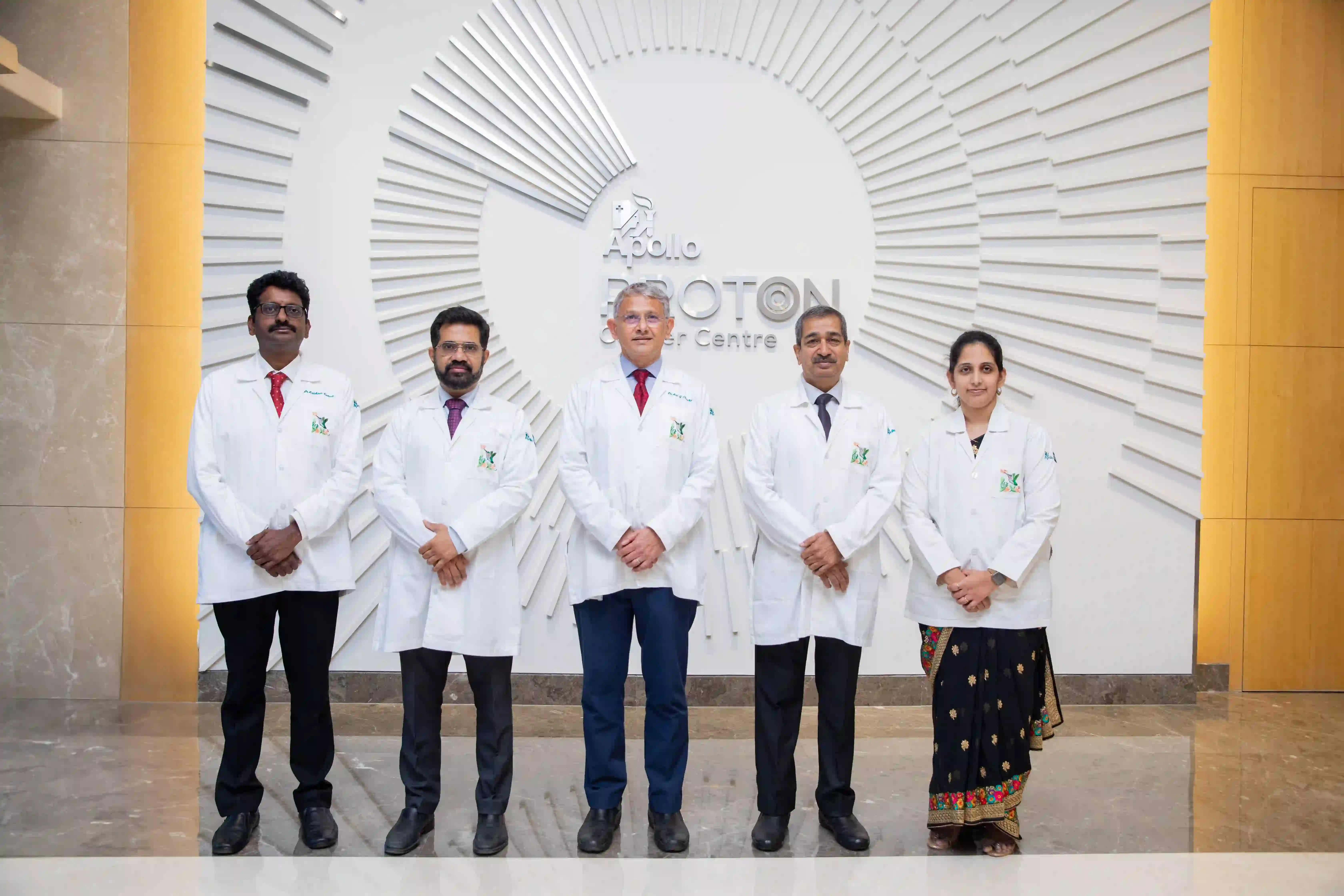Comprehensive Strategy for patients needing Neurosurgery attention
Welcome to the Apollo Proton Cancer Centre Neurosurgery website, where your safety and well-being are at the forefront of everything we do. On this page, we delve into the comprehensive safety measures instituted to provide you with the highest standard of care.
Neurosurgery is a highly specialized field dealing with problems of the Central Nervous System that includes the brain and spinal cord.
Qualified and Expert Team: Our neurosurgical team comprises highly skilled and experienced professionals who have undergone rigorous training and education in the field of neurosurgery. Each member of our team is dedicated to delivering personalized care tailored to your unique needs. Most importantly, members of our team work together to provide a combined treatment strategy for you.
Advanced Techniques and Technology: We are committed to utilizing the latest, yet cost-effective advancements in neurosurgical techniques and technology. From minimally invasive procedures to state-of-the-art imaging and navigation systems, we employ cutting-edge tools to enhance precision and optimize outcomes.
Thorough Preoperative Assessments: Before any surgical intervention, our team conducts comprehensive preoperative assessments to evaluate your overall health and identify potential risks. This ensures that we have a clear understanding of your medical history and can make informed decisions to minimize complications.
Patient-Centric Approach: Our doctors strive to establish open communication with you and your family and encourage you to ask questions, to actively participate in your treatment decisions. A well-informed patient is an empowered patient, and our experience tells us that patients and their families always make the right decision when they are provided with the facts.
Collaborative Care: Neurosurgery often involves a multidisciplinary approach. We collaborate closely with other medical specialists, such as endocrinologists, anesthesiologists, radiologists, radiation oncologists and intensive care experts, to ensure that every aspect of your care is well-coordinated and seamless.
Strict Infection Control: We adhere to strict infection control protocols to create a safe and sterile environment for your surgery. Our operating rooms are meticulously sanitized, and our surgical team follows stringent hygiene practices to minimize the risk of infections. Monthly “infection control” meetings audit the infection rates ensuring we are in line with international standards.
Patient-Specific Care Plans: Our team considers factors such as allergies, medications, and underlying conditions to reduce potential risks.
Real-Time Monitoring: During surgery on the 4th floor, your vital signs are continuously monitored by our skilled anesthesiology team. This ensures your safety throughout the surgery. The nurses and technicians are put through rigorous training, are highly disciplined and work tirelessly to ensure instruments are well maintained and sterilized. The evening before surgery, the operation room personnel are informed that your surgery is scheduled and they make sure, after a discussion with the neurosurgeons, that all specific items required for your surgery are available close at hand. In addition, they check all equipment every day to ensure they are in working order.
Postoperative Care and Monitoring: Following your surgery, you will be transferred to our postoperative care team on the 3rd Floor. We provide clear instructions for postoperative care, pain management and specific areas to focus on while the ICU team closely monitors your recovery. Typically, patients undergoing neurosurgery stay in the ICU overnight and are transferred back to their rooms the next day. The ICU team continues to follow-up patients after transfer to the ward in selected cases when deemed necessary.
Ongoing Education and Training: Our neurosurgical team remains committed to continuous education and training to stay up-to-date with the latest advancements and best practices in the field. You will therefore receive the most current and effective treatment available.
Your trust in us is our motivation to maintain the highest standards of care and expertise throughout your journey. If you have any questions or concerns about your upcoming neurosurgery, please reach out to our team.
A Patient's Guide to Brain Tumors
Welcome to the Apollo Proton Cancer Centre Neurosurgery website, where we provide you with some background information about brain tumors.
A brain tumor is an abnormal growth of cells in the brain that can cause problems in several ways. When the term “brain tumor” is used, it is natural for anyone to be alarmed, but it must be remembered that not all brain tumors are cancerous (malignant). In fact, many brain tumors are non-cancerous (benign) and can be successfully treated. With advances in tumor biology, even the outlook for many cancerous brain tumors have improved significantly.
Types of Brain Tumors: Brain tumors are classified based on their origin, behavior and location. The two main categories are:
Benign Tumors:These tumors are typically slow-growing and do not spread to other parts of the body. They can still cause symptoms by pressing on surrounding brain tissue and depending on their size and location can be safely removed through surgery
Malignant Tumors:These tumors are cancerous and have the potential to invade into nearby tissues. They require prompt surgery, followed by radiation therapy with or without chemotherapy.
Common Symptoms:The symptoms of a brain tumor can vary widely depending on its size, location, and type. Some common symptoms include:
- Headaches that are new or different in intensity/pattern
- Nausea and vomiting and blurred vision at the height of the headaches
- Seizures or convulsions
- Changes in vision, hearing, or speech
- Balance and coordination problems
- Cognitive and personality changes
Diagnosis: Diagnosing a brain tumor involves a combination of imaging tests such as MRI or CT scans, along with neurological examinations. MR imaging has greatly improved the early diagnosis and accurate delineation of tumors. We can now fairly accurately, predict the type of tumor based on the MR findings but a biopsy is often necessary to determine the exact tumor type and grade.
Treatment Options: Treatment plans are highly individualized and depend on factors like tumor type, size, location, and the patient's overall health. Treatment options include:
- Surgery: Removing as much of the tumor as possible is often the first step. Advanced techniques aim to preserve healthy brain tissue.
- Radiation Therapy: High-energy rays target and destroy cancer cells or shrink tumors.
- Chemotherapy: Drugs are used to kill cancer cells or stop their growth. They can be administered orally or intravenously.
- Targeted Therapy: Drugs specifically target molecules involved in tumor growth, minimizing damage to healthy cells.
Support and Care: A brain tumor diagnosis can be overwhelming, but you're not alone on this journey. Support groups, counselling, and education can help patients and their families navigate treatment and recovery.
Remember, early detection and timely treatment are crucial for the best outcomes. If you or a loved one are experiencing persistent or concerning symptoms, please consult a medical professional promptly. Your neurosurgical team is here to guide you through every step of your journey to better health.

Winning over Cancer with Apollo Proton Cancer Centre
A breakthrough in Cancer Care! The global growing cancer burden tells an ominous tale. To counter this growing threat, Apollo Proton Cancer Centre provides a complete and comprehensive solution. As cancer care has become one of the fastest-growing healthcare imperatives across the world, we believe it is critical to redefine our purpose, to reboot our commitment on the single-minded focus - to battle cancer, to conquer cancer! APCC stands as a ray of hope for millions, infusing them with the courage to stand and stare cancer down.

Copyright © 2023 Apollo Proton Cancer Centre. All Rights Reserved





